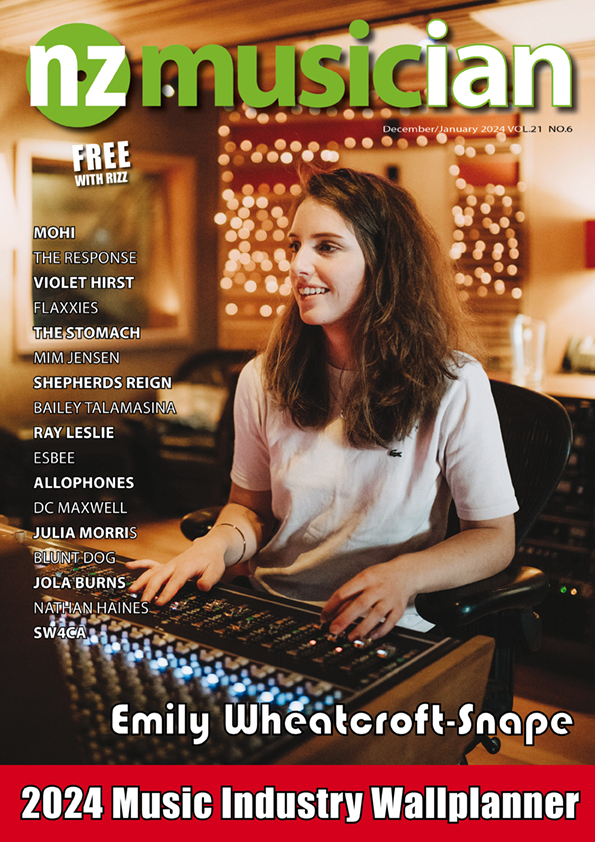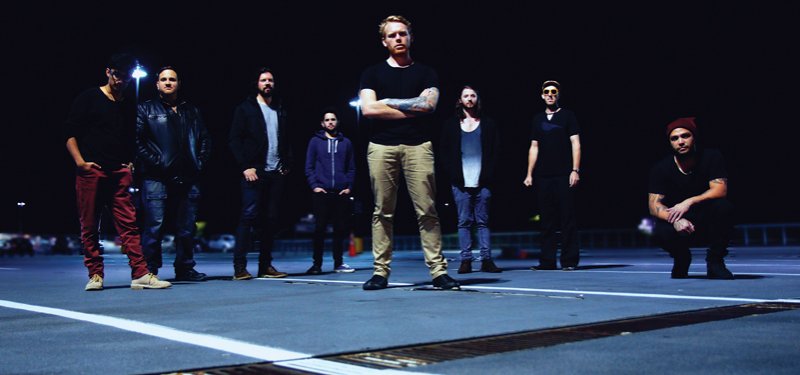B2KDA: Abbreviated Fusion
B2KDA: Abbreviated Fusion
We’ve been dancing happily to them for a decade but now Batucada Sound Machine is no more, the band instead formally acronymed to B2KDA. Characterised by its repetitive style and fast pace, Batucada is described as ‘a sub-style of samba and refers to an African-influenced Brazilian percussive style, usually performed by an ensemble’. While borrowing their name from this sound, B2KDA’s rhythm-driven songs fuse hip hop, soul, rock, contemporary electronica, afrobeat and brass into handclapping, foot-tapping, summery, good-time music. More of a collective than a traditional band, they have a new album called ‘Rising’, about which bassist/manager Alex Urlich and vocalist Paaka Davis talked with NZMs Silke Hartung.
It seems like at no point in the history of B2KDA has anyone ever been confidently able to say who was part of the band at a time. ‘Core band’, ‘touring band’ –– these are terms you hear a lot in interviews.
“The people on the album aren’t the same people who are in the band right now,” laughs bassist Alex Urlich, in NZM’s office along with MC/ vocalist Paaka Davis to promote the band’s fourth album ‘Rising’.
These two, plus Felipe Simonetto (guitars, vocals) make up the current ‘core’ of the band, with additional support and wider membership coming from Joel Shadbolt (guitar, vocals), Guy Harrison (keys, trumpet), Thabani Gapara (sax), Dean Rodriguez (percussion), James Hughes (percussion), Riduan Zalani (percussion) and Adam Tobeck (drums).
Previously packaged as Batucada Sound Machine, the band recently decided to change the band name to the shorter B2KDA, after much deliberation. Why the change? Urlich reveals the (current) band’s frustration with the tricky to pronounce original handle.
“At hundreds of gigs we’d have people say ‘Batacuda’, ‘Barracuda’ – all sorts of stuff – they’d never get it right. You want people to be able remember us, and when they go to check out the band on Youtube, they wouldn’t know what to type.”
One place where the newly adopted name evidently hasn’t been well-received is Germany, long an important market for the band. Their record label there reckons that people won’t be able to grasp how to say B2KDA.
“Our band logo still has the name ‘Batucada Sound Machine’ in it, and thats a compromise for the German market, because our distributor over there says all of our success we’ve had in Germany is associated with the name BSM.”
As a consequence, the German album version will be released with a different art work. Across Europe the band is signed with Cologne-based label Global Music Orchestra, which specialises in and celebrates, local identities of music from all over the world. Familiar GMO labelmates are Moana & The Tribe, whose manager Sol De Sully was also a mentor of B2KDA’s former manager Scott Grafton, and has been very helpful with making contacts for the band over the years.
Grafton and the band amicably parted ways on a management level, though he still looks after their bookings in Australasia. The task of managing the band presently falls to Urlich. Pressed as to why, he says that they realised they could save themselves some money –– quite a consideration when you are talking about an international touring band of nine (or so) players.
“I do most of the management work,” he says. “But we share it – I try to delegate stuff that’s too much for me to Paaka and Felipe. Our company is called Halfblood Music, which James [Hughes] and I are the directors of. He helps with all the money because I’m terrible with taxes and all the rest of it.”
On the downside, Urlich notes, handling managerial work does take away from being a musician, actually writing songs and making music. Being a fairly large band with some more permanent members, some less, decision making also presents a challenge. Davis illustrates with an example.
“Recently we had a subject that we had to make a big decision on. Myself and Joe live in Tauranga now, and we have rehearsals on Monday nights. It was impossible to do the whole coming back and forth for one meeting, so we did it by Skype, and through that we made a decision. If we can’t do it immediately like that, we’ll just wait for a rehearsal and have the meeting afterwards. That’s been going pretty good!”
“We’re trying to be a very democratic band,” expands Urlich. “Communication is the key.When you have nine people in a band, people have different levels of caring about certain things. Maybe this person doesn’t really care about what we put on the poster, while another person might be really passionate about it. I’m always trying to put it across everybody. If they don’t reply, they don’t reply, but at least you put it out there.”
Practically speaking, they’ve found that communication works best for them via WhatsApp.
“That seems to be the one everyone is responding to, more than email. It works!”
Davis’ smile gives away that some frustrating trial and error came before their figuring this out. With funds restricted for publicising the release of ‘Risen’ they’ve spread promotional chores out between each other. Urlich’s strategy was to take a friendly, open approach, backed with a necessary amount of resilience.
“I just emailed, ‘Hey guys, here’s our press kit, would you like to listen to our CD?’, and I’ve done that for every radio station we could find in NZ as well as magazines, online… One thing you realise pretty fast is how little response you get. It’s a challenge just having the time and motivation of getting knocked down, or no response, and to still keep going.”
One encouraging early positive for the album came from Christchurch’s student radio station RDU, where their single Same Old Thing went straight into the weekly Top 10.
“Those stations are the ones we’re aiming for mostly, with our music and the kind of people we are.”
BSM’s last album, 2012’s ‘Don’t Keep Silent’, was recorded by Olly Harmer at The Lab, with production credited to band members Urlich, James Hughes and Richie Setford. At the suggestion of Scott Grafton the band decided to work with Andrew Spraggon to record and produce ‘Rising’.
“We were all big fans of his work with Sola Rosa. Even though we’ve often played with him, we never really hung out much.”
When they first got in touch, Spraggon was in the process of recording his last Sola Rosa album, which saw release near the end of 2014. Surprisingly for a band that is all about the rhythm, Spraggon was charged with creating beats, and brought in bass and synth sounds.
“The electronic elements on the album are his. We showed him demos, and told him the direction we’d like to go with songs, then he fleshed them out, made them sound cool.”
In 2013, with band members spread all over the world, recording of the component parts had to be organised between five different studios. Songwriter and singer Richie Setford (also well known for his own project Bannerman), who penned one of the band’s biggest hits thus far, 2009’s He Said She Said, is currently living in Berlin.
“He might still contribute to the band with songs and on tour, hopes Urlich.
“With technology the way it is, this album was actually partially written in Berlin, sending ideas back and forth,” Davis chimes in. “His vocals on our first single [Can’t Give You (What You’re Asking For)] of the album were recorded in Berlin, and then we joined it together.”
Riduan Zalani’s percussion was recorded in his homeland, Singapore, and the remainder between Urlich’s Underground Studio, Spraggon’s small home-based studio and Ellamy Studios in Blockhouse Bay, Auckland.
Mixing was done by former Fast Crew member Josh Thorne aka DJ Alias, much of it from a Dunedin hospital bed after Thorne had severely damaged his foot in a workplace accident. Mastering was subsequently handled by Mikey Rockwell.
They say that ideas for the new songs came easily, and literally from everywhere. Touring has been the biggest education – and toured they have. Over the last 12 years the band has spent entire seasons in Europe, gathering fresh influences for their own batucada sound from urban turntables and festival stages.
“There’s a club called Cassiopeia near Warschauer Strasse in Berlin and the music they play was great – a lot of stuff from there we’d listen to in the van,” Paaka reminisces.
They cite Buraka Som Sistema as a big influence. The Portuguese act fuse electronica with zouk (a Carribbean ‘fast jump-up carnival beat’ style) and kuduro; – Angolan music, described as ‘upbeat, energetic and danceable’.
“There’s this world-ish vibe, but we didn’t just want to be ‘hippies’. Getting a crowd really cranking, but having those roots – that was what we were trying to achieve.”
Following the October release of the album the band has a busy summer ahead. As well, they are already working on the next album with the current line up.
“We want to make the music representative of the band right now, that’s always our goal,” Urlich closes.
“The reason why there’s still a band is because we love that core essence this band is about; that’s what we want to continue to do. The different line up is going to create different sound. I can’t really say what it’s going to sound like, but we’re very excited, because the musicians are very, very good.
“We were worried the band would lose its identity with changing band members, especially front people, but somehow there has been something underneath that’s been the kind of thing that’s held it all together. I think that’s the concept of what the band is about. In a way it’s almost a collective, with members who have a similar concept, as opposed to similar personalities.”
- 163
- adam tobeck
- alex urlich
- andrew spraggon
- auckland
- b2kda
- bannerman
- batucada
- batucada sound machine
- bsm
- dean rodriguez
- dj alias
- ellamy studios
- global music orchestra
- guy harrison
- halfblood music
- james hughes
- joel shadbolt
- josh thorne
- kuduro
- mikey rockwell
- october/november 2015
- olly harmer
- paaka davis
- richie setford
- riduan zalani
- samba
- scott grafton
- silke hartung
- sola rosa
- tauranga
- thabani gapara



